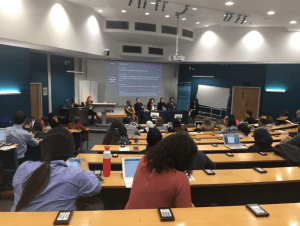Guest blog post by Inspiring Interns.
The UK graduate jobs market of 2016 looks significantly different from that of just ten years ago, and it looks set to continue changing dramatically and at pace. Here we examine four potential developments – in the government’s Higher Education policy, in Britain’s status, and in technology – that might have a major effect on the future faced by young people.
- The planned increase in university fees
The UK government has announced proposals that would allow top universities to increase fees past the current £9,000 cap in line with inflation. The proposals were published in May 2016, in a White Paper called ‘Success as a Knowledge Economy’.
Under the new measures, only those institutions considered to offer high quality teaching would be able to increase their fees; the list of these universities is yet to be announced.
The proposals have reignited protests that tuition costs are already too high. In 2015, the Complete University Guide revealed that 113 out of 120 English Universities were planning to charge the maximum of £9,000 on all undergraduate courses for 2015-2016. Only 6 institutions offered any courses costing less than £7,000. It has also been revealed that graduates from English universities face the highest debts of all English-speaking countries, owing an average of £44,000.
One stated aim of the proposals is to level the Higher Education (HE) playing field, increasing diversity and social mobility. However, the planned rise in fees could see this average increase further, and potentially discourage students from less affluent backgrounds from applying to the best universities – or from going to universities at all. This would have a knock-on effect on their career choices and prospects.
- New ‘Challenger Institutions’
The White Paper also announced plans to increase competition in the HE sector by encouraging ‘challenger institutions’. Private colleges will be able to award their own degrees and to achieve full university status more quickly than before, provided they meet required standards.
Martin Doel, Chief Executive of the Association of Colleges, suggested that this change would ‘empower more people than ever before to access HE in their local area through a college’. Doel continued to say that it ‘will also provide a wider choice of courses that are linked to employment.’ The proposals could make it easier for private companies to start universities and award their own degrees, including multinational giants like Facebook, Apple, and Google.
This will encourage rather than start a new trend. The FTSE 100 education company Pearson founded Pearson College London in 2012. The College currently offers a business degree validated by Royal Holloway University, but plans to gain degree-awarding powers.
As of yet, Facebook and Google seem to have no such plans, telling Times Higher Education that they had ‘nothing to add’ to the story. However, were such colleges to be created they could offer specialist courses that linked directly to employment demands, and that would narrow the UK’s skills gap. If the quality of these institutions can be guaranteed, they would give young people an exciting new route into graduate employment.
- The rise of artificial intelligence
Another significant shift in the graduate jobs market could result from the rise of robotics and artificial intelligence (AI).
New automated systems are expected to transform many sectors, including the legal sector and compliance. ROSS, an artificially intelligent attorney that conducts legal research, has recently been ‘hired’ by the law firm BakerHostetler. This is just one example of research and analysis work previously done by human employees, and often by graduates, that can now be done quicker and more accurately by robots.
Recently the Chairman and Managing Partner for the UK and Ireland at EY, Steve Varley, suggested that the number of graduates hired by the firm could drop by 50% by 2020 because of the way technological advances are speeding up audit.
The rest of the Big Four professional services firms – Deloitte, PwC, and KPMG – have not predicted a similar cutback, although there may be a shift in recruitment patterns as they look to hire graduates with very strong digital and technological skills.
And while AI might change the nature of graduate roles, it could potentially be a change for the better if graduates are offered more challenging and engaging work while robots plough through data in their place.
- Brexit
On 23rd June, Britain voted to leave the European Union, and one thing at least was agreed on by all news outlets: it was a ‘seismic’ decision. Sending shockwaves through the economy as a whole, Brexit seems likely to lead to significant change in the graduate job market. But as with everything surrounding the vote, no one is quite sure what the new landscape will look like.
The general mood amongst British students appears to be one of apprehension. According to a report conducted by Transferwise just prior to the Referendum, 80% of students they surveyed are concerned about the impact Brexit would have on their career prospects.
What does seem certain is that – unless the UK signs up to the freedom of movement to secure a trade deal with EU member states – it will become more difficult for UK graduates to look for work in Europe, as they would no longer be able to work abroad without a Visa or similar permit.
There are also fears that leaving the EU could lead international firms to reduce their presence in Britain or to recruit workers fromelsewhere. Reassuringly, the head of HSBC has recently confirmed that the bank will not move its headquarters overseas, a decision first reached in February 2016 after months of debate; however, whether other companies make the same choice has yet to be seen.
Young citizens of the other EU member states will also face greater restrictions on coming to the UK to work or study. Whatever your ethical stance on immigration, it is probable that this would boost graduate recruitment of UK citizens by reducing competition for roles. However, restrictions could also exclude talented individuals who offer a vital contribution to the economy.
At the moment, it seems unclear whether the economy will stabilise, or if we’re in for a bumpy ride for a number of years. Unfortunately, in times of recession, the graduate jobs market normally suffers disproportionately, and recruitment by employers big and small may be reduced in the short-term. However, the silver lining for graduates lies in the fact that companies looking to save on their bottom line often prefer the idea of a graduate hire to an experienced hire whose expected salary might be much higher.
Claire Kilroy is a content writer for the UK’s leading graduate recruitment agency, Inspiring Interns. If you’re on the hunt for internships or graduate jobs in London and beyond, why not check out their website, or head to their blog for more graduate careers advice.



 Close
Close









